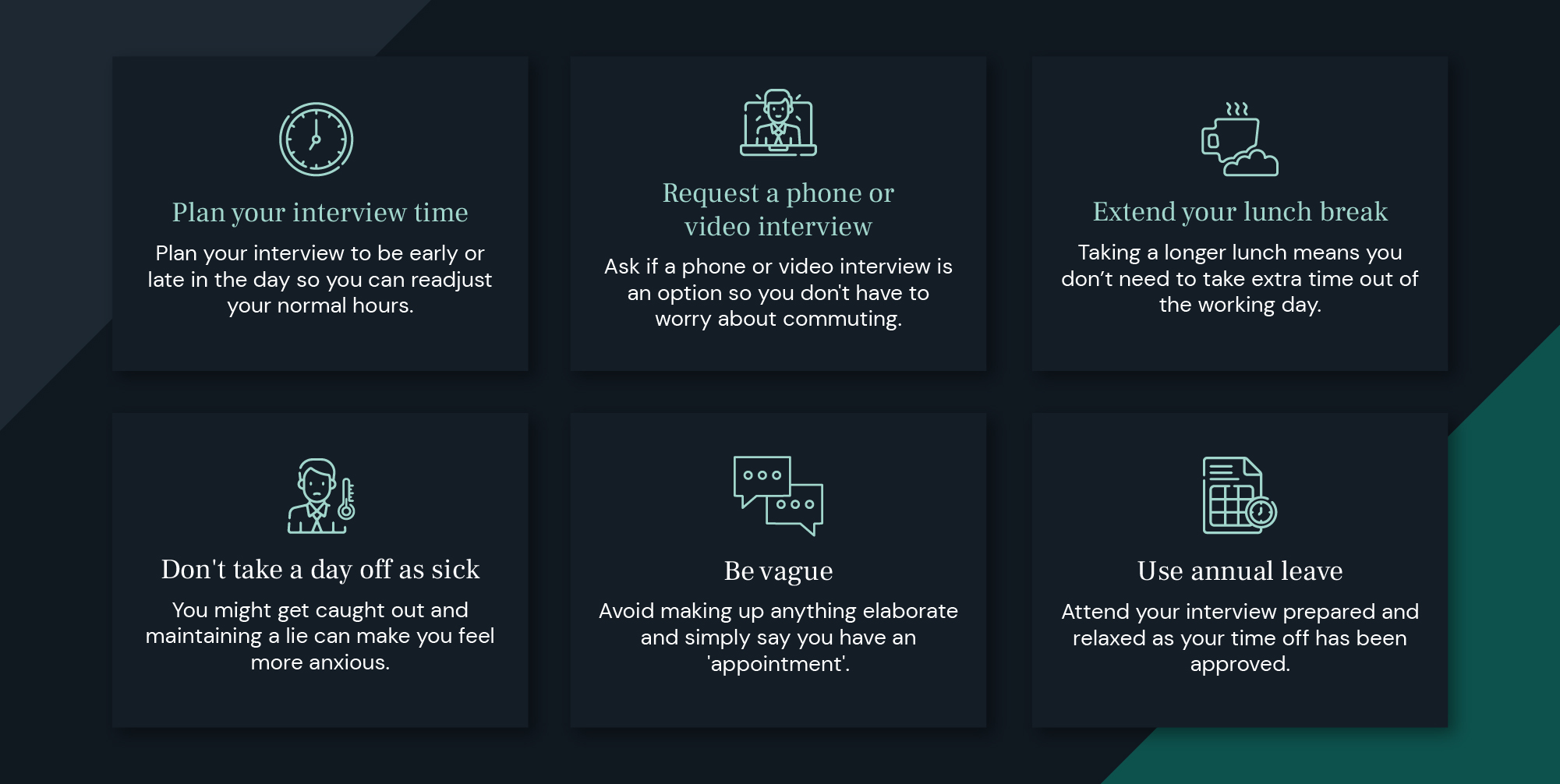Knowing how to get time off for an interview is one of the most challenging parts of job hunting.
Whilst you’ll be excited at the thought of securing your new job, you don’t want to jeopardise your current job in the process by being dishonest.
Landing an interview is a great sign, but there’s no guarantee that this is going to result in you getting a job offer. You need to tread carefully and strike the right balance between remaining professional and committed in your current role, whilst making enough time to attend your interviews.
Although taking a day off sick might seem like the best option in this scenario, dishonesty can be risky! Also what if there are stage 2 and stage 3 interview rounds to consider? Are you going to take more sick days for those too?
This will soon raise a few eyebrows and can unnecessarily put you in a compromising position.
Thankfully there are other ways to navigate this delicate process, which is why we’re providing your complete guide on how to get time off for an interview – without prompting questions.

Tips for Getting Time Off for An Interview
It’s always going to feel a little awkward as you’re trying to keep your current employer content whilst still pursuing new opportunities.
By following the tips below, you should be able to stay on good terms with your current manager whilst successfully finding time to attend an interview.
Carefully plan your interview time
If possible, try and plan your interview to be early or late in the day.
By doing this, you can go to work an hour later or finish an hour earlier which is minimal disruption to your usual working day. Also by saying you have a ‘private’ appointment, this is highly plausible as doctors/ opticians/ dentists etc aren’t always open on a weekend.
It’s also a lot easier to come and go from the workplace by readjusting your hours rather than taking a full day off (or worse, taking a day as sick).
Request a phone or video interview if possible
If you’re struggling to get time off work to attend an interview in person, speak to the hiring manager or recruiter to see if a phone or video interview is an option.
This requires much less of your time as you won’t have to worry about commuting, so you could even do it before work or on your lunch break. Also by preparing for your remote interview and making sure you’ve considered the set up (i.e. limiting distractions, choosing a suitable background etc) this can be an effective solution.
Some businesses are keen to interview candidates in person, however, so be prepared to consider other alternatives if this isn’t an option.
Take a longer lunch break
You’re entitled to a lunch break so you could always use this time to attend an interview.
Whether that’s dialling in remotely or driving to a specific location, using your lunch break means you don’t need to take extra time out of the working day.
If you are attending the interview in person, make sure you consider how long it’s going to take for you to get there/ back, and speak to your manager if you need to extend your usual break.
Don’t take a day off as sick
Whilst it might be tempting to pull a sick day to cover the time you need off for an interview, this is not the best move.
Not only are you risking being caught out but it can also give you more things to worry about as you need to maintain the lie. This can cause more problems than it’s worth, especially if you could take some annual leave instead.
You also never know who you’re going to run into on your way to the interview and you don’t want to be anxious before you even get there.
Keep your reasons vague
If you need to take time off for an interview or you’re starting work later to accommodate your interview slot, keep your reasons vague, but honest.
Avoid making up anything elaborate as this can tie you up in knots later down the line. Instead, stick to phrases such as ‘I need to take some time off for an appointment’ or ‘I have a personal matter to attend to’ as this gives enough of an explanation without going into too much detail.
Most good employers won’t pry too much and will respect the fact that you have other things that need your attention outside of work.
Use an annual leave day
This is by far the best way to get time off for an interview!
Rather than reshuffling your working day to accommodate an early/ late interview, or pulling a sickie, taking an annual leave day allows you to attend your interview prepared and relaxed. It removes the risk of you ‘bumping into anyone’ or having to keep up a lie, as your time off has been approved.
Sometimes you’ll need to request an annual leave day at short notice which can be problematic. However the best thing to do is to speak to your manager to see if there is a possible solution.
Having the full day also allows you to get yourself ready so that you can arrive on time without the worry of lying or trying to squeeze it into your lunch hour.

What to Consider When You Can’t Get Time Off for An Interview
When you’re struggling to get time off for an interview, it can be easy to consider staying put for the sake of ease. You might also start to feel guilty as you realise you’re going to have to figure out some kind of workaround so that you can still attend your interview.
Whilst these feelings are common for anyone trying to pursue new career opportunities, it’s important to remember why you’re applying for a new job. The below points might be helpful when you’re struggling to get time off from your current employer.
Speak to the recruiter or hiring manager
Your first point of call should always be speaking to the recruiter or employer. If you’re struggling to get time off work (perhaps you’ve not given enough notice to your current employer or there’s an important meeting that day), let them know and see what they can do.
They might be able to move the date of your interview, or as discussed above, offer you an early or late slot. Don’t just accept that you need to cancel your interview because getting time off is proving difficult.
The hiring manager or recruiter will also appreciate your honesty, making them more inclined to rearrange your interview slot – especially if they’ve been impressed by your CV.
On that note, we’ve got a whole post dedicated to writing a successful CV so make sure to give it a read!
Don’t feel guilty
Feeling guilty is normal when you’re applying for new jobs, especially when you’re still in a job. However, you have nothing to feel guilty about as it’s important you work in a role that makes you happy.
People leave jobs for a whole host of reasons and you need to remember these reasons when you’re anxious about getting time off. There’s no need to second guess or explain yourself, as you’re pursuing new opportunities for a reason.
Don’t overshare
If you’re struggling to get the time off to attend an interview, don’t speak to people at work about it. Even if you think a colleague is a close friend, you can never be sure who they’re going to tell.
The only person you should be speaking to is your manager – and even then, you shouldn’t be revealing the reason why you need the time off. Until you’ve received and signed your offer letter, keep the details of your interview private.




